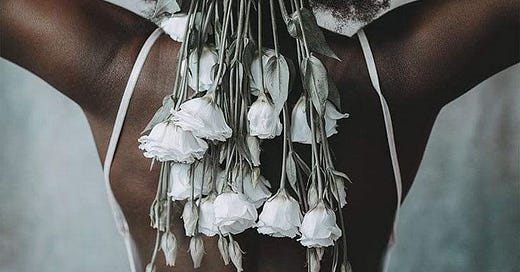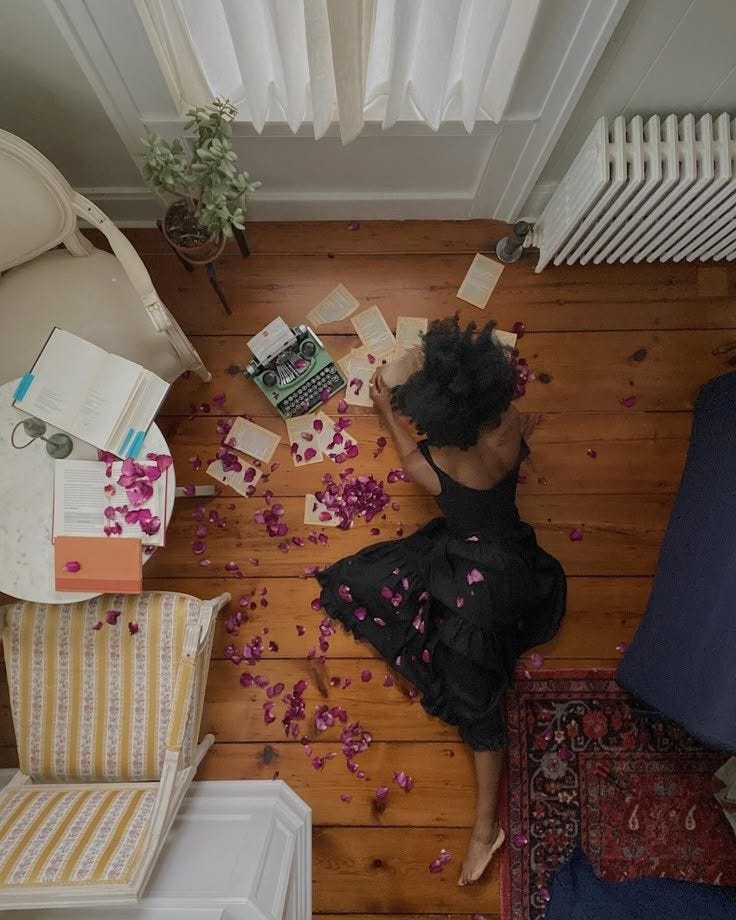The quality of light by which we scrutinize our lives has direct bearing upon the product which we live, and upon the changes which we hope to bring about through those lives. It is within this light that we form those ideas by which we pursue our magic and make it realized. (Audre Lorde)
Poetry, explains Lorde, is not a luxury.
When I sit with this, I’m reminded that how we see shapes what we allow ourselves to become. Audre Lorde isn’t talking about poetry as metaphorical fluff — she’s naming it as essential technology for transformation. The “light” is the inner gaze, the witness — the quiet but powerful act of paying attention to what lives within us before it has form or name. Poetry, then, becomes a kind of ambitious compass, guiding us toward lives not yet lived, but deeply felt — nurturing a world-building and future-making soft with potential.
black women breathe flowers, too. just because we are taught to grow them in the lining of our quiet (our grandmothers secret) does not mean we do not swelter with wild tenderness. we soft swim. we petal. we scent limbs. love. we just have been too long a garden for sharp and deadly teeth. so we have grown ourselves into greenhouses. -greenhouses
^Poem by Nayyirah Waheed
Black women breathe flowers too. What a beautiful world of tenderness and power this line paints. We breathe softness, scent, and love into spaces that don’t always make room for it. And yet, as Nayyirah writes, we have been too long a garden for sharp and deadly teeth — open, exposed, giving, cut deeply. Surviving the trampling and the taking, we’ve learned to protect what blooms within us. We are greenhouses — sanctuaries where beauty can flourish, where softness is welcome, where growth is no longer dependent on weathering violence.
I see tenderness in this world. I also see revolution.
You build your world out of the belief of what you deserve.
Few things limit us more profoundly than our own beliefs about what we deserve, and few things liberate us more powerfully than daring to broaden our locus of possibility and self-permission for happiness. The stories we tell ourselves about what we are worthy or unworthy of — from the small luxuries of naps and watermelon to the grandest luxury of a passionate creative calling or a large and possible love — are the stories that shape our lives. (Maria Popova)
This is a quiet rebellion, to choose tenderness in a world that has taught us to battle. Believing in our own deservingness is not just self-care — it’s defiance. When we dare to broaden the boundaries of what we believe we’re worthy of — not in theory, but in the everyday — we begin to architect lives that reflect that belief. We stop waiting for permission and start designing lives rooted in joy, rest, creative expression, and expansive love. The revolution is not only in the grand gestures; it’s in the decision to believe that your softness, your pleasure, your magic, your becoming — are not luxuries, but necessities. Greenhouses don’t just protect the bloom; they create the conditions for it to thrive. So must we.
Poetry is not a luxury. It is a vital necessity of our existence. It forms the quality of light within which we predicate our hopes and dreams toward survival and change, first made into language, then into idea, then into more tangible action. The farthest horizons of our hopes and fears are cobbled by our poems, carved from the rock experiences of our daily lives. (Audre Lorde)
Poetry offers a blueprint of possibility.
For women, “ this place of possibility is buried beneath strata of historical silence and is therefore especially powerful once poetry - poetry as a revelatory distillation of experience, not sterile world play — does the vital work of excavation.
To write, then, is to dig. To write your feelings is to restore to truth what norms would have you bury. Poetry becomes a map back to ourselves, to what we’ve always known but have been taught to overlook.
For within structures defined by profit, by linear power, by institutional dehumanization, our feelings were not meant to survive. Kept around as unavoidable adjuncts or pleasant pastimes, feelings were meant to kneel to thought as we were meant to kneel to men. But women have survived. As poets.
We were never meant to make it here with our whole selves intact, yet here we are — imagining, creating, birthing a new world anyway.
This is the precarious balance of a thriving society: exposing the fissures and fractures of democracy, but then, rather than letting them gape into the abyssess of cynicism, sealing them with the magma of lucid idealism that names the alternatives and, in naming them, equips the entire supercontinent of culture with a cartography of action. (Maria Popova)
This is the power of poetry — to hold both the wound and the balm. To name what was once unnamable, but deeply felt. To reimagine what was once deemed impossible. Writing becomes a kind of greenhouse — a shelter for truth, a container for memory, a climate where new language and new life can grow. In a world that is often unjust and unkind, we protect the tender, tend to our becoming, seed new worlds, and breathe flowers.
Dig Deeper
Light a candle. Pour yourself some tea. Grab your fluffiest blanket and your favorite journal. Let’s begin.
I remember sitting in my aunt’s English class on Saturday mornings at MRC Learning — a school with incredibly gifted teachers dedicated to helping students pass the Caribbean national exams. I started attending at age 8, seated beside 12- and 14-year-olds. Sometimes, Aunty Sheilah would assign us poetry, and I hated it. What nonsense, I thought. Look at how the tables have turned! Because now, here I am… about to ask you to write a poem. Not for school, not for critique — but for yourself.
And to take the pressure off, I invite you to write bad poetry. Yes, you heard me.
Let it be messy. Let it rhyme awkwardly or not at all. Let the metaphors wander.
The only rule? Whatever you write must be true.
So here is your assignment:
Write a poem about the greenhouse you want to build out of your life.
What would it protect? What would it nurture? What would grow there — tender and wild and yours?
👋🏾 tee tee afen, ta ta for now
References
Lorde, A. (1985). Poetry is not a luxury. The Broadview anthology of expository prose, 217-220.





